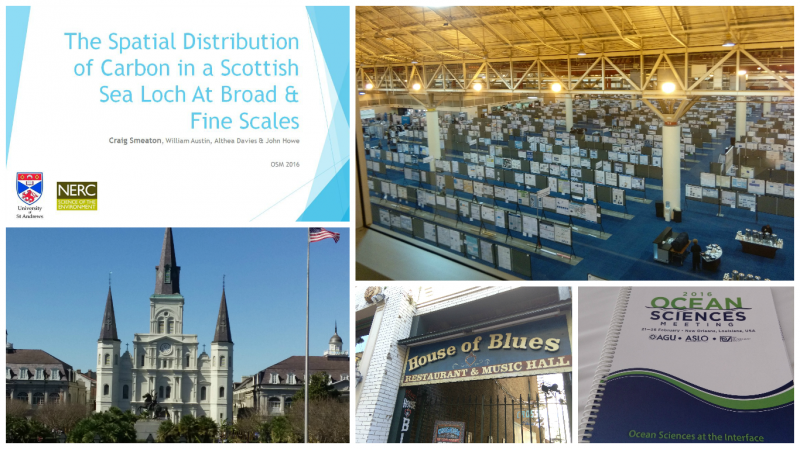Ocean Sciences 2016: New Orleans
Craig Smeaton

The Ocean Science Meeting (OSM) happens every two years and attracts poster and oral presentations from across the globe. The conference brings together all forms of ocean and marine science ranging from ecosystem science to physical oceanography and everything in between; this makes it the ideal place to present multidisciplinary research such as my own.
The week started off with a bang with Tornados in the surrounding county and high winds and rain hitting the city but this did not put a dampener on the conference. Early in the week I attended the Early Career icebreaker and networking events were I met up with colleagues and friends.
During the week I attend sessions on both my topic area and sessions with no direct connection to my research such as the Oceanography of Saturn’s Methane Seas. The sessions which I attend were all interesting and many presentations had some relevance to my work. Of particular interest was a number of talks by scientist currently working on NERC’s Biogeochemistry of Shelfs Sea program which gave me insight into some of the carbon cycling processes which my research does not touch upon. There were hundreds of posters on display and many were of interest to me; a number of these focused my mind on ideas that I have be contemplating and I’ am know keen to try some off these ideas out in the near future.
On Thursday the 25th I gave my presentation “The Spatial Distribution of Carbon in a Scottish Sea Loch: Broad and Fine Scale Observations” within the session EC41B: Understanding the Coastal Carbon Cycle and Biogeochemical Processes in the Coastal Ocean: Observations and Modeling. The presentation was well received and has resulted in the offer of additional analytical work and possible future collaboration with one of the leaders in the research area.
Apart from the academic and networking side of the conference I got to experience the city of New Orleans which is unlike any other place I have visited in the US before. There was great sights, foods and experiences throughout New Orleans but the French Quarter of the city was the highlight for me.
Again I am thankful for the support from the Challenger Society to attend OSM 16 and present my research and experience New Orleans.
Latest News
Royal Society Publishing Photography Competition 2025
Please see a message from the Royal Society below:
We are delighted to announce that the 2025 Competition is now open for entries until 15 August for a chance to win £1000! The competition celebrates the power of photography in conveying the wonder of science happening all around us and photographs can be submitted in the categories of: Astronomy, Behaviour, Earth Science and Climatology, Ecology and Environmental Science, and Microimaging.
The competition is free to enter and open to anyone studying or working in science at graduate level or above. Category winners will receive a one-year membership to the Royal Photographic Society and the overall winner will receive a grand prize of £1,000. Find out more: https://bit.ly/RSPphotocomp
October 2025 MEDIN Workshop: Marine Data Management, Governance and the MEDIN toolset
The Marine Environmental Data and Information Network (MEDIN) are pleased to announce that registration is now open for the next occurrence of our popular free online training workshop: ‘Marine Data Management, Governance and the MEDIN toolset’ on the 13th – 17th October 2025 on OceanTeacher Global Academy.
Marine Data Management, Governance and the MEDIN toolset
The Marine Environmental Data and Information Network (MEDIN) and OceanWise are delighted to invite you to attend our popular free online training workshop: ‘Marine Data Management, Governance and the MEDIN toolset’ on the 19th – 23rd of May 2025.
